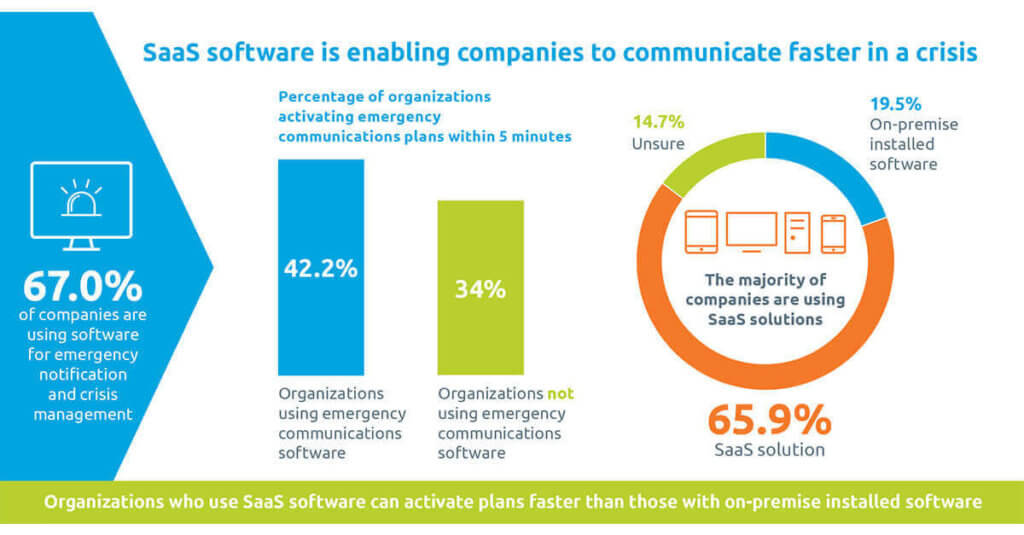Communication in a crisis – when the clock ticks faster
By Eske Ofner, Head of Sales at F24 AG

Red alert! Today any company can be hit by a crisis at any time.
The Coronavirus and its effects on companies are probably the most recent example – also for the fact that the trigger of a crisis does not have to be remotely related to the own business activities. But how do you react properly in an emergency? An important key is efficient communication. This is the basis for decision-making but it’s also a mammoth task. Fortunately, it can be mastered with the intelligent use of automation and special software, and companies can often prevent the worst from happening.
Whether natural disasters, cyber-attacks or business-critical incidents such as loss of production – they all have one thing in common: they are complex situations that can quickly develop an unpredictable momentum of their own. A good contingency plan is therefore essential, but not sufficient.
It is crucial to be able to react quickly and adequately at all times during the course of a crisis. This requires fast, efficient communication that provides each target group with correct current information at the right time via the appropriate channels and ensures a constant and consistent exchange.
Only one third of companies are able to activate their communication plans within five minutes in an emergency.
Eske Ofner, Head of Sales at F24 AG
The “golden hour” – acting quickly to prevent the worst
Those who know how to communicate efficiently as soon as a crisis occurs have the best chance of quickly regaining control of the situation and limiting the damage as much as possible. The business continuity industry also speaks in this respect of the “golden hour”. In the shortest time possible, all stakeholders need to be informed, information gathered, measures coordinated and initiated.
The measures taken in the first minutes and hours have a decisive influence on the outcome of a crisis. However, as the results in the current report show, the “golden hour” is more of a symbol today – de facto it is more about the golden five minutes in which the processes ideally have to be initiated.
What sounds simple in theory often proves to be difficult in practice. 665 business continuity experts were interviewed in the Emergency Communications Report 2020 by the Business Continuity Institute (BCI). They considered gathering, validating and sharing information, communicating with employees as well as getting staff to follow planned procedures to be the three biggest challenges. Consequently, the top three hurdles to efficient crisis response are incorrect employee contact details, lack of understanding from recipients and unavailability of mobile network.

Communication during a crisis – highest demands on timing and correctness
The best information is worthless if it does not reach the recipient on time or is inconsistent and confusing. Lengthy, manual phone call chains are therefore just as impracticable as they are prone to errors. Who is able to repeat the same words robot-like over and over again? Who calls a 10th time when a line is always busy? And who knows, for each recipient, which channel or which number they can best be reached on at any given moment?
Accident, cyber-attack, flooding – different kinds of crises are very different in character and the communication style must take this into account. Sometimes only a few people have to be alerted; sometimes thousands need to be instructed with different messages via multiple channels. Certain scenarios require the coordination of emergency forces and require their rapid feedback, while others require the secure, real-time collaboration of locally dispersed teams and experts.
No matter what means of communication are used, any crisis communication is only as good as the infrastructure permits.
Eske Ofner, Head of Sales at F24 AG
The critical baseline: a reliable communications infrastructure
No matter what means of communication are used, any crisis communication is only as good as the infrastructure permits. The crisis communication media of choice, in most companies, is email and text messages.
But what if this infrastructure is no longer available after a cyber-attack? Or an email turns out to be causing the crisis? What if the mobile network is overloaded in the event of a disaster and text messages are only delivered hours later? Crises are also security-sensitive situations. Internal communication must be confidential and secure. Despite all this, 23% of companies surveyed in the BCI Emergency Communications Report 2020 use private, insecure messaging services such as WhatsApp.

Fast, efficient and secure crisis communication can rarely be achieved without technical support. Automated alarm systems are therefore increasingly finding their way into companies. According to the Emergency Communications Report, the proportion of companies using such systems rose from 49% in the previous year to 67% in 2020.
And they are proving themselves necessary: Over 42% of companies using an automated solution are able to initiate their communication processes within the five minutes. In contrast, only 34% of companies that work without such a system succeed in doing this.
Fast, efficient and secure crisis communication can rarely be achieved without technical support.
Eske Ofner, Head of Sales at F24 AG

Safe, reliable, fast: Advantages of automated alerting and communication
As important as skills such as intuition or social interaction are in a crisis, people can be just as fallible when it comes to speed, accuracy and endurance in hectic crisis situations. The main advantages of state-of-the-art alerting systems are therefore:
Saving time by the fast alerting of large groups of people
At the push of a button, the systems alert in parallel over a large number of channels in a matter of seconds and can therefore reach hundreds of addressees within a few minutes and, when necessary, obtain feedback.
Clarity of communication through predefined content
Using defined alarm scenarios, previously created voice or text messages can be sent to pre-configured target groups.
Overview through real-time monitoring
Those who are responsible for crisis management remain up to date on the status of the alerts in real time through aggregated, clear information on the basis of the responses.
Capability to act due to high availability and security
SaaS solutions hosted by a specialist provider have high availability as well as being reliable and legally compliant. They are ready for use even when a company’s own systems are down.
Collaboration in dispersed teams through secure conference systems
In addition to alerting, many systems also offer the possibility of hosting chat forums or telephone conferences in a very straightforward manner.
These systems can also accomplish something else that hardly anyone thinks about during a crisis, they record all the activities that take place in accordance with auditing requirements. This is not only necessary to fulfil documentation obligations or to comply with reporting deadlines, such as in the case of a data breakdown, but also facilitates the evaluation and improvement of these processes after the incident.
Crisis communication is therefore subject to the principle that has proven its worth for many demanding tasks: The best teams are those in which human know-how and state-of-the-art technology form a powerful unit, because the question is no longer how to prevent a crisis, but how to master it through being well prepared and acting quickly.